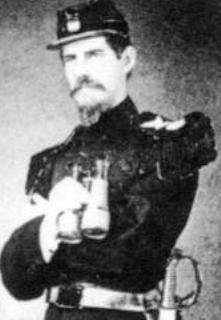Walter Phelps facts for kids
Quick facts for kids
Walter P. Phelps Jr.
|
|
|---|---|

Colonel Phelps in 1862.
|
|
| Born | October 29, 1832 Hartford, Connecticut |
| Died | February 28, 1878 (aged 45) Bennington, Vermont |
| Place of burial | |
| Allegiance | United States of America Union |
| Service/ |
United States Army Union Army |
| Years of service | 1861-1865 |
| Rank | |
| Commands held | 22nd New York Infantry Eastern Iron Brigade |
| Battles/wars | American Civil War |
| Spouse(s) | Eliza Ann Schenk |
| Children | Mary |
| Other work | lumber merchant, iron manufacturer |
Walter P. Phelps Jr. (October 29, 1832 – February 20, 1878) was an important officer in the Union Army during the American Civil War. He was known for leading the Eastern Iron Brigade.
Contents
Who Was Walter P. Phelps Jr.?
Walter P. Phelps Jr. was born on October 29, 1832, in Hartford, Connecticut. Later, he moved to Glens Falls, New York. There, he worked as a lumber merchant, selling wood.
Joining the War Effort
When the Civil War began, Phelps helped create the 22nd New York Volunteer Infantry Regiment. This group of soldiers officially joined the army on June 6, 1861. They were set to serve for two years. Phelps was made a colonel, which meant he was in charge of this regiment.
Colonel Phelps later took command of a larger group called the 1st Brigade. This happened after General John Porter Hatch moved to a different role.
Phelps wrote about taking command: "Following orders from General Hatch, I took charge of his brigade on Sunday, September 14, [1862] at 10 a.m. General Hooker's army was then moving through Frederick towards Middletown on the main road."
Leading the Iron Brigade
At this time, his group was known simply as the "Iron Brigade." This was before another famous group became known as the "Iron Brigade of the West."
During the Battle of Antietam on September 17, 1862, Phelps's "Iron Brigade of the East" played a key role. They helped and saved the other Iron Brigade. Phelps's soldiers bravely moved through a cornfield, supporting General John Gibbon's Iron Brigade.
One of his regiments, the 14th Brooklyn, helped the 6th Wisconsin Volunteers. They stopped a charge by the Confederate soldiers. Phelps's Brigade pushed the farthest during the fight. The 14th Brooklyn was the only regiment to reach the Dunkard Church and hold their position, waiting for more soldiers to arrive.
After the War
When the war ended, Phelps received a special honor. He was given a brevet promotion to Brigadier General on March 13, 1865. A brevet promotion is an honorary rank given for good service. After this, he left the volunteer army.
Phelps went back to Glens Falls. He became a successful iron manufacturer.
He died suddenly on February 28, 1878, in Bennington, Vermont. He was buried at Green-Wood Cemetery in Brooklyn.
External links
 | Claudette Colvin |
 | Myrlie Evers-Williams |
 | Alberta Odell Jones |

